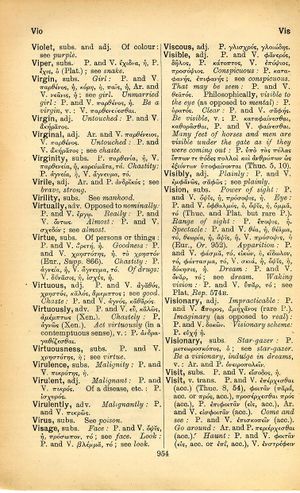virus
Τὸ γὰρ θανεῖν οὐκ αἰσχρόν, ἀλλ' αἰσχρῶς θανεῖν → Mors ipsa non est foeda, sed foede mori → Das Sterben bringt nicht Schmach, doch sterben in der Schmach
English > Greek (Woodhouse)
subs.
See poison.
Latin > English (Lewis & Short)
vīrus: i, n. Sanscr. visham; Gr. ἰός, poison,
I a slimy liquid, slime.
I In gen., of animals and plants, Verg. G. 3, 281; Col. 2, 14, 3; Plin. 19, 5, 27, § 89; 30, 6, 15, § 45; Stat. S. 1, 4, 104.—Of animal sperm or semen, Plin. 9, 50, 74, § 157.—
II In partic., in a bad sense.
A A poisonous liquid, poison, venom, virus (syn. venenum).
1 Lit., Cic. Arat. 432; Verg. G. 1, 129; 3, 419; Ov. Tr. 3, 10, 64; Plin. 34, 17, 48, § 160: amatorium, id. 8, 22, 34, § 83.—
2 Trop.: evomere virus acerbitatis suae, Cic. Lael. 23, 87: futile virus linguae, Sil. 11, 560: mentis, id. 9, 476; Mart. 13, 2, 8.—
B An offensive odor, stench, Lucr. 2, 853; Col. 1, 5, 6; Plin. 11, 53, 115, § 277; 27, 12, 83, § 107; 35, 15, 52, § 185: odoris, an offensive pungency, id. 28, 3, 6, § 31; 28, 7, 23, § 79.—
C A sharp, saline taste; of sea-water, Lucr. 2, 476; 5, 269; 6, 635.—Of wine, Plin. 14, 20, 25, § 124.
Latin > French (Gaffiot 2016)
vīrus,¹¹ ī, n.,
1 suc, jus, humeur : cochlearum Plin. 30, 44, bave des limaçons || semence des animaux : Virg. G. 3, 281 ; Plin. 9, 157
2 venin, poison : Cic. Læl. 87 ; Virg. G. 1, 129 ; 3, 419
3 mauvaise odeur, puanteur, infection : Plin. 11, 257 ; 19, 89 || âcreté, amertume : Lucr. 2, 476 ; 5, 259 ; Plin. 14, 124.

